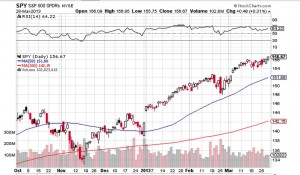
Yippee! The S&P 500 is trading in new high ground. Time to break out the bubbly, right?
Not so fast. While it’s fun to watch the media jubilation about the news, it’s more important to step back and consider what this means to your portfolio.

First, ask yourself this question: Why are you investing? Most people would probably smirk and say, “To make money.” OK, I get that. But here’s something that might surprise you: “Making money” is not the correct answer.
Want to know what the real answer is? The reason you are investing is to offset future liabilities. That’s it. And if you think that suggests the need for a financial plan, you’re right.
When you are looking at the need to offset future liabilities, it’s incumbent upon you to consider inflation. Those of you who took basic finance classes may recall one of the earliest lessons: A dollar today is worth more than a dollar tomorrow. Inflation is one of the truths behind that statement.
In my former life as a trader, I focused on the growth potential of individual stocks. I understand how much fun it can be, unearthing a hot new IPO or a little-known small-cap that’s poised to blast off into the stratosphere (or so you hope).
But if you are the type to get excited about what’s happening with Proto Labs (PRLB), at the expense of your overall financial plan, then you may as well drive down the street and randomly toss your money out the window. Because despite some big gains here and there, most traders also suffer big losses and spend a lot of money on brokerage fees as they move in and out of stocks based on somebody’s theory.
Today, I’m out of the trading business and in the advisory business. I was tired of enabling traders’ adrenalin addictions and wanted to make a real difference in people’s lives.
At Portfolio, we continue to see the potential for investors in 2013. But rather than betting on which stocks may be big winners, we focus on each client’s financial plan and then tailor an investment strategy accordingly. We also carefully consider situations in which annuities would be appropriate. In other words, the portfolio must match the plan. It’s not about cheering on index strength, without understanding what that means for each person’s unique situation.
Does that mean I won’t follow individual stocks? Of course not. We do run an Equity Overlay portfolio, consisting mostly of large caps, with a smattering of mid-caps. But here, too, the portfolio is allocated according to investor needs, rather than what’s hot now.







